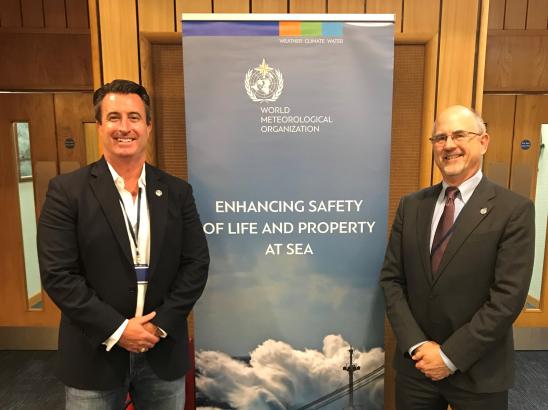
Representing Maritime College, Captain Morgan McManus, Master of the Empire State VI, traveled to London, England, for the first international symposium on “Extreme Maritime Weather: Towards Safety of Life at Sea and a Sustainable Blue Economy.” Jointly organized by the World Meteorological Organization (WMO) and International Maritime Organization (IMO), the conference took place from October 23 to 25. Over 200 participants from nearly 40 countries gathered to collaborate and exchange ideas to improve communication and operations between land and sea.
Speaking on behalf of mariners, Captain McManus offered insight on the impact of heavy weather on crew members onboard a ship. Mariners are faced with operational challenges, avoiding heavy weather to navigate through storms with information provided by weather routing services. “There is wonderful meteorological data out there. However, most of it depends on an internet connection and almost all commercial ships do not have a strong internet connection. It’s all satellite,” he explained. The unintentional disconnect between weather routing services and ships prevents crew members from receiving information to make crucial decisions to reroute, leading to further obstacles such as crew fatigue and delayed ship maintenance.
As a panelist, he informed the audience on the training and preparation Maritime College offers to future mariners. Gaining hands-on experience, students practice forecasting and observing weather patterns aboard the Empire State VI. “While standing watch, the bridge team gathers weather related information to send to the Voluntary Observation System, known as VOS,” he shared. The data collected is then used to help shore-based forecasters with weather predictions and mapping. Working alongside their captain and crew mates, 1/C navigators compare weather routing with the intended voyage plan to determine if course or speed changes need to be made on the training ship.
Great strides were made in the three-day conference and among the main questions participants were left to answer was, “How do we prepare future mariners?” Captain McManus shared one final thought for his peers, “Invite more maritime schools to the symposium to speak in depth about educating future mariners. We need more input on training techniques to prepare students for navigating and forecasting heavy weather.”